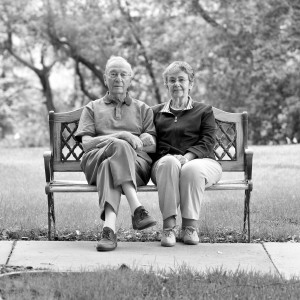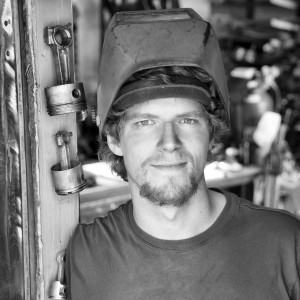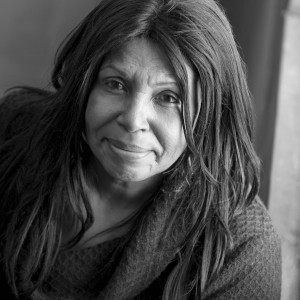David A. De Lampert Jr. has been living on the streets of Minneapolis for the past 30 years. A veteran, he survives on disability checks and through gratuities people offer him.
David spends his days inviting people to sign his coat with a permanent marker. When they sign, they will often give him a dollar or two “to help keep me going.” He has filled up more than 100 coats with signatures over the past decade, as well as hats, umbrellas, and canes.
For David, collecting signatures began as a way to survive, but eventually became a way for him to reach out to other people.
I feel it”'s the richest thing you got going for you is your name. As we fight in this world to obtain something for ourselves and to be somebody – nobody wants to feel like they”'re nobody, no matter who it is. I encourage people to believe, in my travels, that we are somebody. That everybody is somebody, regardless if you are an addict, alcoholic, or whatever. Whatever your vice is in life, I happen to believe you can be at peace with yourself. Get to know who you are. This has given me an opportunity to know me.
People are so hard on each other, nitpicking and always looking for something wrong and wanting to put someone down. People don”'t know how to forgive. That”'s the one thing the world ain”'t caught onto yet, forgiveness. We have a problem with forgiving each other so we gonna have a problem with being at peace with each other.
And then you got those who like to keep up a lot of razzamatazz. They like to keep up a lot of bullshit. There are those in this world who are not satisfied unless they are jamming somebody else”'s life up.
And to find out there are people in high places who do things like that, it kind of frustrates me, because I work hard at maintaining my own peace down here. I don”'t get up there. I get to stay down here. And there”'s a great gulf between the ones at the top and we who are at the bottom. But one more day above ground is better than one underneath, so I try to be at peace most of the time.
FRED AND JUDY BARON
Fred and Judy Baron are survivors of Nazi death camps. They met after they were liberated from the camps and were recovering in a hospital in Sweden. They moved to America, got married, and started a family.
They recall the absolute absence of peace in the camps and how they found peace again in their lives. Both Fred and Judy feel strongly that it is our obligation to look after one another in this world, especially those who are less fortunate than ourselves.
J: It wasn”'t a community. It was a bunch of people who were afraid to be dead the next minute. There could be no peace in a place like that.
F: I have hope that we learn from each other, that each generation learns from the previous one. I do realize that the learning process is difficult and has its up and downs. But we have learned so much, we have achieved so much in our relatively short human existence. We can send a man to the moon and we brought him back. We are routinely sending objects around the globe. We have stations in outer space. We can build atomic bombs and atomic research centers and atomic installations for good and for bad. We can take the organs out from one person and place them into another to give them life. We have done unimaginable things. We have created tiny little objects and apertures that can talk to us. They can do things mathematically and scientifically that took people a generation and they can do this in a matter of seconds. So we have reduced time and space and effort and whatnot. But in the way we relate to each other in a personal way – person to person and people to people – progress is much more difficult and much slower. That is what we have to strive for.
HANS EARLY-NELSON
Hans Early-Nelson is a metal sculptor and artist. An avid biker and swimmer, he talks about learning to live in a community.
Hans sees himself as a mediator and offers as an example of urban justice a time when he witnessed a robbery. He tracked down the thief and convinced him to return the money to its rightful owner. In the process, Hans learned something about the thief”'s history and wound up giving him $10 of his own money as a reward for returning the cash he had just stolen.
As civilization has progressed, we”'ve become detached from the earth and from our true primal instinct to survive and provide for ourselves. I know there was conflict and war thousands of years ago, so you can”'t say that it”'s technology or cell phones and missiles that have created unrest and disagreements around the world. But the fact that we”'re not providing for ourselves is a barrier. We”'re not connected to our purpose to survive. We”'re so well provided for that we kind of don”'t know what to do in the world. I feel that way sometimes, anyway.
We”'re also so confined in this space. We”'re bumping up on each other all the time. I think a lot of it has to do with people needing to be places and feeling like there”'s never enough time. And that translates to “you”'re in my way.”
I believe in survival of the fittest, in many ways, and so there”'s always going to be some kind of conflict. I prefer there to not be war and bloodshed but I feel like conflict is our inherent way of working our differences out. The ideal peaceful world to me would be rid of violence, but there”'d still be altercations. There”'d still be some wrestling and some jaunting and I feel like we can achieve that. Perhaps get rid of the warheads and all the guns. I prefer there not to be enraged violence to the point of killing people or maiming people, but there would be scuffles, there would be bruises.
Hudlin Wagner
Hudlin Wagner says that her perceptions of peace are a result of her tri-cultural background. She is black, Native American, and West Indian. Hudlin defines peace, initially as a physical feeling – a lightness of being, which includes a spiritual connection with the world and its order.
When Hudlin was a young girl, her parents decided that she should attend the local Catholic school. As the first student of color to attend the school, she found that none of the children would sit near her because they were afraid that her skin color would rub off on them if she touched them. When she asked her parents to send her to a different school, they told her, “This is your journey to be introduced to each individual human being – so you don”'t recreate the stereotypes of every race.”
When we talk about peace, we think about war. But we have to begin in our own land, in our own families, even in our own lives. Integrating the discussion of peace into our lives early on through our learning systems would help us consistently envision peace as achievable. Instead, our society has romanticized warriors: Genghis Khan, the Zulus, the Iroquois.
I believe in the goodness of human beings. A large percentage of people around the world do share a deep desire for peace, but we don”'t often exercise a means of achieving it.
I”'m hopeful because I”'m seeing more and more individuals step forward. Neutrality won”'t be an option. We are living in a time when the impact of not working together for peace leaves us only the alternative of destruction. We need to hear from the leadership of the next generation coming up around the world. We”'re ready for it. We are accustomed to thinking about addictions as abusive and destructive. I would love to live in a society with people who are addicted to peace. Wouldn”'t that be one hell of an addiction?














Hello – David once had me design the 8 dollar bill for him and it is quite a story. I used to give him rides if I ever saw him at a bus stop.